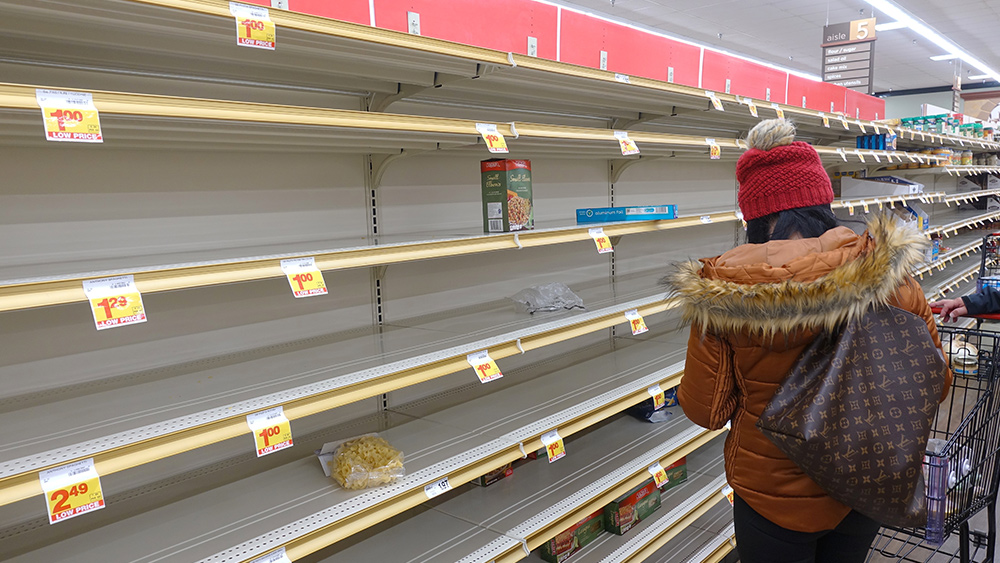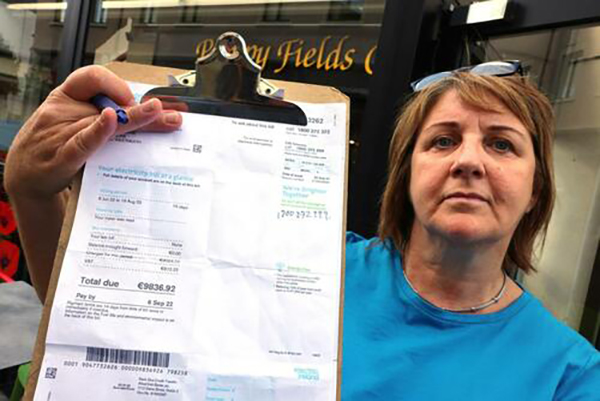Empty shelves reported at grocery stores across the U.S. as supply chain, omicron and weather issues converge
01/19/2022 / By Cassie B.

It’s beginning to look a lot like the early days of the pandemic in grocery stores across America, as store shelves are once again growing empty while supply chain issues and a surge in coronavirus cases create the perfect conditions for widespread shortages.
Many Americans are currently being forced to quarantine or work from home as Omicron surges, which is causing the demand for groceries to rise at the same time that supplies are remaining low thanks to worker absenteeism and other issues. The fact that processed food and produce companies are experiencing significant backlogs is only making the problem worse.
These shortages are particularly pronounced in the Northeast, where severe winter weather has led to even more problems with supply lines. Right now, American retailers are reporting that 12 percent of their normal stock for food, beverages, personal hygiene products and household cleaning products are entirely out of stock. When it comes to food products specifically, retailers report being out of 15 percent of their usual inventory.
Those consumers who do manage to find what they need are paying significantly higher prices than they did even a year ago. According to the Bureau of Labor Statistics, the consumer price index rose 7 percent in 2021 in the quickest increase seen since 1982. The price of steak is up 21 percent, while the price of bacon is up 19 percent, eggs are up 11 percent, and cereal is up by six percent.
According to Reuters, the consumer packaged goods industry is missing roughly 120,000 workers while just 1500 jobs were added last month. The National Grocers Association reports that many of its grocery stores are operating with less than half of their usual workforce.

Many people have been quitting their jobs as the stresses of working at grocery stores rise. Employees have been working in person throughout the pandemic and contending with angry customers who are upset about food shortages and COVID measures like mask requirements. In response to the exodus of grocery workers, several supermarket chains have been offering better benefits, tighter security and higher pay in hopes of attracting new workers.
Several experts have said that the situation will continue for at least another month. For example, the CEO of ConAgra brands, Sean Connolly, told investors: “It’s entirely possible for all of us to project that the next month or so could remain strained with the supply chain as Omicron runs its course.”
Supply chain problems, inflation making matters worse
Increases in the price of gas have caused supermarkets’ transportation costs to skyrocket, with perishable produce growers across the West Coast now being forced to pay nearly three times the trucking rates seen before the pandemic to ship their goods before they spoil. Some produce growers have been holding off on shipping to retailers until the freight costs go back down. Meanwhile, a significant volume of cargo ships remain docked outside the ports of Long Beach and Los Angeles waiting to unload.
Some of the food categories that have been seeing shortages include baby formula, aluminum, cream cheese, chicken, and dog and cat food. Toilet paper is also in short supply in many areas, with some stores instituting limits on the amount that people can buy.
The CEO of the grocery store chain Albertsons announced that the Omicron variant is impacting its supply chain’s ability to recover and expects supply challenges to persist for the next four to six weeks. He said that although his supermarkets have been experiencing several product categories being completely out of stock for a few months now, they’re doing their best to make their stores presentable and give consumers as much choice as possible.
Sources for this article include:
Submit a correction >>
Tagged Under:
chaos, crisis, economic collapse, food collapse, food shortages, food supply, grocery, infections, Inflation, labor shortage, omicron, outbreak, pandemic, panic, products, supply chain
This article may contain statements that reflect the opinion of the author
RECENT NEWS & ARTICLES
COPYRIGHT © 2017 COLLAPSE.NEWS
All content posted on this site is protected under Free Speech. Collapse.news is not responsible for content written by contributing authors. The information on this site is provided for educational and entertainment purposes only. It is not intended as a substitute for professional advice of any kind. Collapse.news assumes no responsibility for the use or misuse of this material. All trademarks, registered trademarks and service marks mentioned on this site are the property of their respective owners.





















